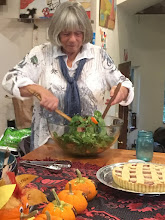In 2001 Ph.D-wealthy Barbara Ehrenreich descended into the world of the common laborer to research her book, Nickel and Dimed. Expecting to find the life perfectly awful, that's what she found. I have also worked as a common laborer, only my jobs were not for research but for money, and my conclusions were different from hers. Like her, I have been a waitress and a housecleaner. I've also been a cashier, a secretary, a tomato picker, and a tree planter. Like Ehrenreich, I learned something from each job, but for me the lessons were not social theories but life lessons.
The summer after my freshman year at college, needing money for a semester in France the following spring (I wouldn't be able to go if I didn't have it), I looked around for the quickest way to make the most money and decided to wait tables. I easily secured a job at Johannan's, a fancy restaurant in Atlanta, even though, at that time, a college girl who waited tables was an anomaly among career waitresses. My coworkers were the kind of tough women who wait tables in fictional truck stops or younger women who would soon be like them. In the end, though, my difference didn't matter. My coworkers cared only that I did my job well and got along well. I respected them, learned from them, and passed muster.
Because I like good food, I enjoyed helping create a pleasant dining experience for my customers. I smiled at them and filled their orders accurately with all the exceptions, substitutions, and special treatment they requested. I learned to carry six plates in two hands, to keep an eye on diners who were almost finished while I was taking orders from new customers, to pacify unhappy customers, serve drinks from the bar, and bus tables quickly. No matter how busy the dining room or how tense the work, my smile was quick and sincere because I enjoyed what I was doing. My customers responded in kind. They said, curiously, "You're not really a waitress. What are you doing here?" When I told them, they would say, "Well, good luck. You have a beautiful smile." They left good tips.
Every night when I came home, dog tired but with heavy apron pockets, I sat at the sunporch table, took my shoes off, and tossed the night's take onto the table. Straightening the crumpled bills, I counted my money, gloating like a miser at each night's well earned take. The job was good, and the money was good. And the next spring, the rewards were high.
If I were writing Nickel and Dimed, I would report differently from Ehrenreich. Granted, I was still living with my parents, so I was spared a worker's usual monetary pressures. But I think the point is more that the job itself was satisfying to me. I returned to it twice later in my life, once at an upscale pizza restaurant near Emory University, in Atlanta, and again at a casino restaurant on Lake Tahoe. In the first, I enjoyed the fast-paced demanding work environment and the vast range of people who eat pizzas, from auto mechanics to university professors to hair dressers. The Lake Tahoe job was difficult because I was working the midnight shift and because I didn't enjoy the casino atmosphere, but I liked serving the entertainers who arrived after their shows (B. B. King, most notably). Every day, when I got off work at 7:00 a.m., I drove immediately to a small bay on the lake to swim in the beautiful blue water of Lake Tahoe and doze for a while among the warm white rocks of the shore.
I don't doubt that Barbara Ehrenreich's experiences were as she told them, but mine were different and perhaps just as noteworthy. Waiting tables is not always a terrible job.
Next week: "Down South, Naturally"

No comments:
Post a Comment